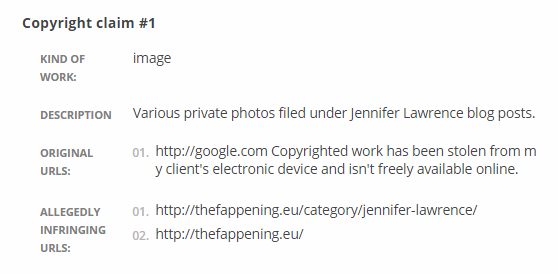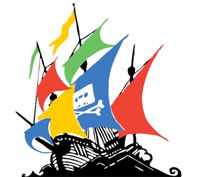Jennifer Lawrence Gets Google to Censor Leaked Pictures, Sort Of
samedi 18 octobre 2014 à 21:50![]() Over the past several weeks hundreds of photos of naked celebrities leaked online. This “fappening” triggered a massive takedown operation targeting sites that host and link to the controversial images.
Over the past several weeks hundreds of photos of naked celebrities leaked online. This “fappening” triggered a massive takedown operation targeting sites that host and link to the controversial images.
As a hosting provider and search engine Google inadvertently plays a role in distributing the compromising shots, much to the displeasure of the women involved.
More than a dozen of them sent Hollywood lawyer Marty Singer after the company. Earlier this month Singer penned an angry letter to Google threatening legal action if it doesn’t remove the images from YouTube, Blogspot and its search results.
“It is truly reprehensible that Google allows its various sites, systems and search results to be used for this type of unlawful activity. If your wives, daughters or relatives were victims of such blatant violations of basic human rights, surely you would take appropriate action,” the letter reads.
While no legal action has yet been taken, some celebrities have also sent individual DMCA takedown requests to Google. On September 24 Jennifer Lawrence’s lawyers asked the search engine to remove two links to thefappening.eu as these infringe on the star’s copyrights.

This means that both the thefappening.eu main domain and the tag archive of Jennifer Lawrence posts no longer appear in Google’s search results.
Whether this move has helped Lawrence much is doubtful though. The site in question had already redirected its site to a new domain at thefappening.so. These links remain indexed since they were not mentioned in the takedown request.
The good news is that many of Lawrence’s pictures are no longer hosted on the site itself. In fact, the URLs listed in the takedown request to Google no longer show any of the infringing photos in question, so technically Google had no obligation to remove the URLs.
A prominent disclaimer on the site points out that the operator will gladly take down the compromising photos if he’s asked to do so. Needless to say, this is much more effective than going after Google.

Source: TorrentFreak, for the latest info on copyright, file-sharing and anonymous VPN services.



